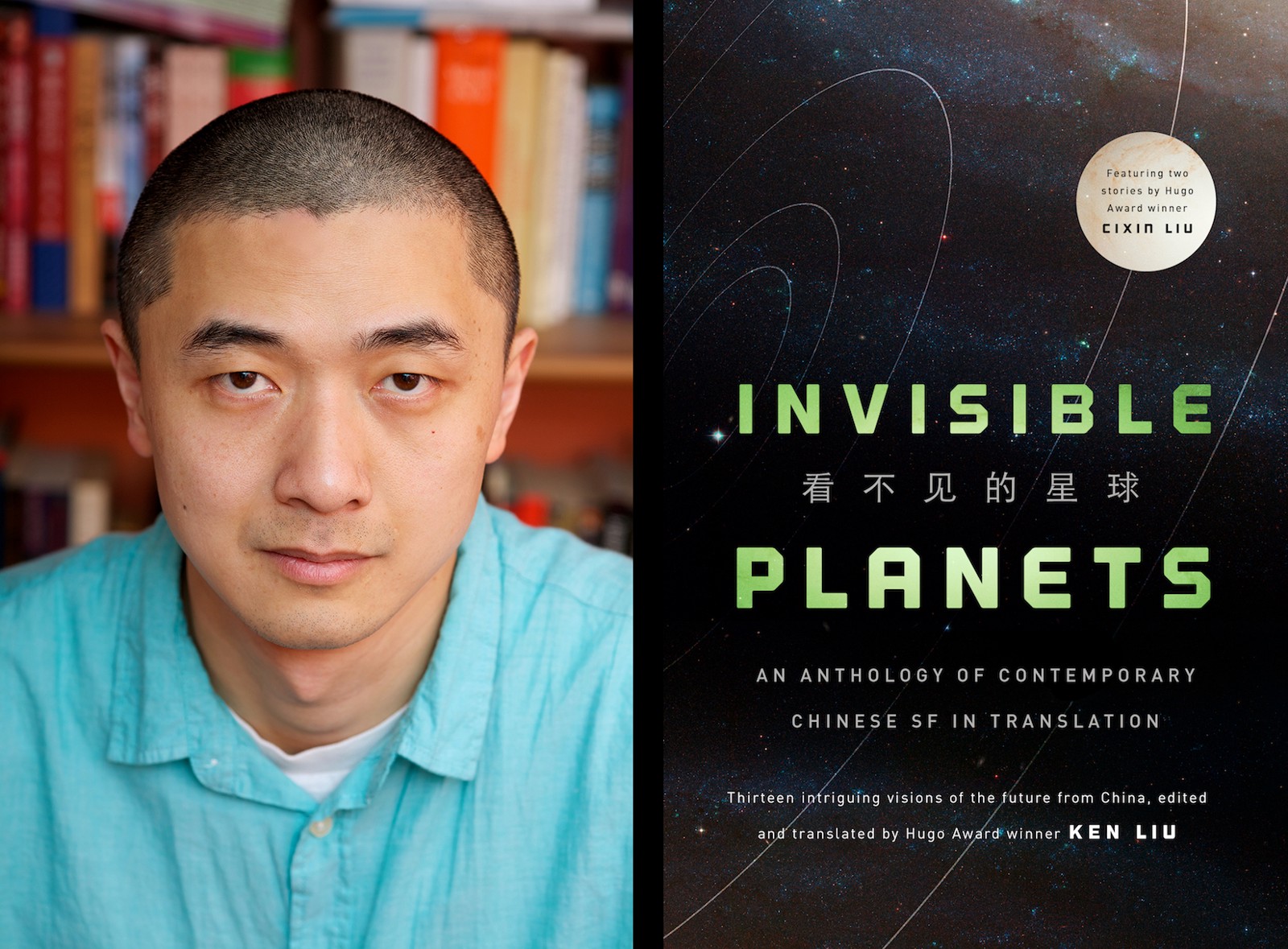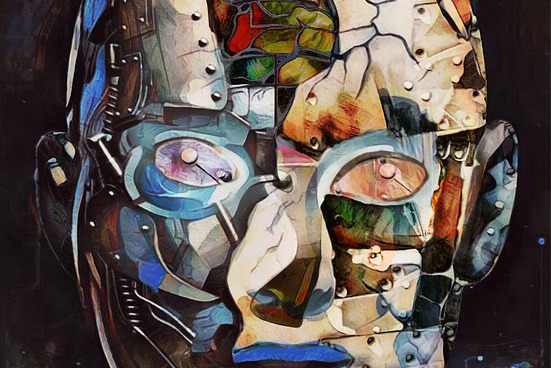Craft
Ken Liu Will Keep an Open Mind
The author and translator on Chinese Sci-Fi & the Universe’s End

Ken Liu is a literary powerhouse. He’s the author of the acclaimed collection The Paper Menagerie and Other Stories and the Dandelion Dynasty series of novels, beginning with The Grace of Kings. His work as a translator includes the first and third volumes of Cixin Liu’s Remembrance of Earth’s Past trilogy, The Three-Body Problem and Death’s End. (Joel Martinsen translated the second book, The Dark Forest.) And as an editor, he’s recently compiled Invisible Planets, which contains a stylistically diverse range of contemporary Chinese science fiction; he also translated each of the stories contained in it into English.
The array of work in the anthology is expansive, taking in a wide range of work, from the philosophical to the comic to the visceral. Cixin Liu’s “Taking Care of God,” in which the aliens that created life return to Earth in search of a new home; Chen Quifan’s “The Year of the Rat” depicts a surreal nightmare of warfare and genetic engineering; and Xia Jia’s “A Hundred Ghosts Parade Tonight” blends metaphysical elements with a haunting (no pun intended) description of economic desperation.
I spoke with Liu about his work and a translator, and about how Anglophone perceptions of Chinese science fiction are (or are not) changing over time.
Tobias Carroll: In translating Cixin Liu’s Death’s End, was there anything you found particularly challenging?
Ken Liu: I’m not sure that Death’s End was distinctly challenging compared to, say, the first book. In terms of what’s difficult about translating a book like that: there’s a common misconception that the technical language is difficult. I think that’s not true. The technical parts are really trivial to do. The global language for technology these days is English, and therefore, even technical terms in other languages are constructed along English models or are simply translated from English. Therefore, to translate a technical term from Chinese into English is very trivial and not particularly challenging.
What is far more challenging and interesting is understanding and knowing the technical background that’s employed by the author, and then trying to convey that in a way that makes sense. Different readers have different expectations and experience levels. You can’t just translate word for word. It’s not going to be particularly compelling, or interesting, or accurate. As a translator, you have to perform and re-interpret and reconstruct in a way that makes sense.
A lot of what I’m going to say about translation really has to do with the fact that translation is a performance art. This is not my comparison, but rather the comparison of William Weaver, the translator of Italo Calvino in the US. I think it’s really true. With different kinds of performance art, we tend to understand how the performance works; as an audience, we have an appreciation for what kinds of challenges the performers face. For example, a musician playing a composer’s piece would understand the range of choices that they make and understand what they can and can’t do to affect our enjoyment of the piece. With plays, we understand what actresses and actors can do and what directors can do to affect our experience of a play, differently from the words written by the playwright.
Translation, I think, is very difficult for most readers to understand, especially readers in the English-speaking world, who don’t read a lot of translation. It’s hard for them to understand what that means and what translators can and can’t do, and what sort of challenges they might face.
Carroll: Did you have any kind of a back-and-forth dialogue with Joel Martinsen about maintaining the author’s voice into English across all three books?
Liu: There are multiple levels to that. One of them is, Cixin Liu changes as a writer over time, between the books, so his style is very different. The other is, I don’t think it’s valuable at all for different translators to try to use the exact same approach. That’s pointless. You wouldn’t want two musicians who are performing the same composer’s work to somehow agree on one style of performance; that’s not what we’re interested in. In this case, Joel and I agreed on a set of terms early on, to not call the same thing by different names. Other than that, we decided that we wanted to go with our own distinct approaches. We have different philosophies. We’re friends, and we like each other, but it’s most effective for us to take different approaches. The three books are very different in style, and were written with very different voices. There was no need for us to get in each other’s way, in that sense.
Carroll: If you had told me, after reading The Three-Body Problem, where Death’s End ended up, I would have been shocked. The trilogy goes through so many cycles and reinventions.
Liu: He writes like no one else, and he changes greatly between books, which makes it both more fun and more challenging to do translation in a way that preserves that spirit.
Carroll: The only other work of his that I’ve read is his story in Invisible Planets, and then “The Poetry Cloud” in the Ann and Jeff VanderMeer-edited The Big Book of Science Fiction. It was interesting to see these very different sides to his work in both of those anthologies as well.
Liu: He is even more accomplished as a short story writer than as a novelist. “The Poetry Cloud” is one of his most amazing works. I really, really enjoy it. “Taking Care of God,” in Invisible Planets, is a different kind of work, and I also like that a lot. They’re very different kinds of works, and he is interesting as a writer, because he covers a wide variety of styles, and has a very big range.
Carroll: In both “Taking Care of God” and the end of the trilogy, there’s a sense of the universe as both a very dangerous place, where humanity is in constant danger, but also a strange kind of optimism. I found the way they coexisted to be very interesting.
Liu: I wouldn’t quite phrase it the way you did. In some interviews, he is baffled by the way that we interpret the story as somehow tragic. Look, the universe is going to end; that’s just a fact of life. The universe is going to end some day, and we’re all going to die. That’s real. There’s nothing sad about that; that’s just part of life. At the end of a comedy, we think the hero and heroine get married and everyone’s happy–they’re all going to die in another hundred years! If you wait long enough, everything turns into a tragedy. Everything ends with death. Death’s End and “Taking Care of God” are not tragic in that sense. These are stories about the grand history of the universe. We know how the universe is going to end. That’s the way is is. Whether a story is a tragedy or a comedy or a story of heroism or pessimism or optimism depends on how you get there.
The universe is going to end some day, and we’re all going to die…There’s nothing sad about that; that’s just part of life.
As far as I can tell, these are all incredibly happy stories. Humanity is the real hero. We are tiny, we are insignificant, and yet we manage to rise above ourselves. It is the duty of every species to rise up and to be grander than what their limitations are, to encompass the universe in spirit, if not physically. I find that incredibly optimistic. I don’t read these books as being pessimistic, or as saying that the universe is dangerous. I think they’re saying that the universe is uncaring, but also very beautiful, and that we are very lucky to be alive in it.
Carroll: One of the things I appreciated when reading Invisible Planets was that you had multiple stories by each of the authors featured in it. Did you have that plan in mind going into the book, or did it come up further into the process?
Liu: This is different from most other anthologies you’ll read. With most anthologies, an editor has an idea, and they’ll go through books and pick out things they like, and [then] they might pitch the idea to a publisher or do the selection later. Invisible Planets didn’t happen that way. Invisible Planets was not an anthology that began with an idea. It basically represents a selection of stories that I found to be the most compelling in my journey through contemporary Chinese science fiction, and that I personally enjoyed, and think are in some way representative of the genre.
I had no interest in doing an anthology when I started doing the project many years ago. I was just a reader and a fan, and I realized that I wanted to share some of these stories with my fellow Anglophone readers, and I started doing translations. By the time I had so many translations and had done so many stories, I thought that I could pick out a bunch that were really strong and compelling and create an anthology out of it. That happened at the end, rather than the beginning. This one didn’t start out with an idea, but rather, ended with an idea. It was a journey; it was the summary of my own personal journey. That’s a little different than a lot anthologies you’ll read; it didn’t start with a theme or an idea: “let’s do the best science fiction and fantasy of this year,” or anything like that. It was just me, wandering through the garden, being struck by certain beautiful pieces, noting them down, translating them or saying, “I’m going to do this later,” and eventually saying, “Gosh, I have so many of them–let’s put them together into a book!”
Carroll: You spoke earlier about the performative aspects of translation. You’re also a writer; do the two go hand-in-hand for you, or do you need to restrain parts of your writing side when translating?
Liu: I don’t think of them as being in conflict or competition. There are plenty of composers who are also performers, like Mozart. There are lots of playwrights who are also active in the theater, either as directors or as actors and actresses. I guess it’s similar. These are two very different kinds of art. They superficially have some resemblance, but they’re not terribly related. In writing, you are creating an artifact that is entirely textual, that is entirely based on the written tradition and the ideas that you are trying to express, the emotional journey that you want readers to go on. In translation, it’s a performance, and like any performance art, you’re much more driven by the audience. What you’re doing is a much more intense version of the dialogue with the audience than you would as a writer. As a writer, you’re mediated somewhat, but as a translator, you’re not. For me, the two are very different things. I don’t think of them as being in conflict or in competition.
I do think that translation uses a very different part of my mind. The time that I spend in translation doesn’t really feel like it’s taking the energy I would have had for writing away, and vice versa.
Carroll: Since you began translating some of these stories into English, have you found any changes in how Chinese science fiction is perceived by Anglophone readers?
Liu: I can’t say I have, beyond the most superficial ways. When I started doing translations, many of the magazines had never published a translation before, and many of the Chinese authors had not been translated before, so it was all new. Several years later, now with The Three-Body Problem being a Hugo winner and Death’s End being on the New York Times bestseller list, when I mention Chinese science fiction, many more Anglophone readers know what I’m taking about. They’ll say, “Oh! I’ve read The Three-Body Problem,” or, “I know Clarkesworld is doing that translation series.” If nothing else, there’s much more of an awareness. I don’t know if there’s any deeper critical discourse that’s changed in the intervening years.
One thing I would hope is to see is for translations in general — not just of Chinese science fiction — to become more a part of our Anglophone reading, so that we no longer see those works as different, as translations, but rather as entries in the global conversation. I don’t think we’re there yet, and I don’t know if we’re going to get there, but I’m encouraged by the fact that a big publisher like Tor Books, and Head of Zeus in the UK, are willing to put out an anthology like Invisible Planets. Hopefully we can pave the way for more great translated fiction from other parts of the world. I know there’s exciting stuff being written around the world, and we’d all benefit from having it.
Carroll: In several of the introductions in the anthology, you address the dangers of thinking of writers from any one country too monolithically, or of interpreting some of the issues addressed in these stories as being specific to one country rather than reflecting global concerns.
Liu: I think there’s a particular danger with fiction from China. China is of interest to a lot of Americans, because there’s a huge level of distrust and a huge amount of wishful thinking on our part as to what China is like. We don’t trust China. We’re very suspicious of it; we view it as a rival, and possibly, we cast it in a villainous color. We often think of China as kind of a dystopia, and we think that everybody there is terribly happy all the time, that they’re slaves enduring a dystopian existence. The reality, of course, is far more complicated. It’s not like that.
My caution is that, if you go in there with the idea that what the media tells you is all there is to know about China, then yes, you’re going to read all these works with a particular set of frameworks and a particular set of expectations. All texts are packed by reader expectations and interpretive frameworks before they can be unpacked. If you go in there with these expectations and interpretive frameworks, then, no, you’re probably not going to enjoy these stories very much, because all they’ll do is confirm your pre-existing prejudices.
If you go in a little more open-minded and abandon those media notions and just say, “I don’t know a whole lot about China, and I’m not sure I’ll learn a whole lot from these stories. So let me go in there and try to keep an open mind and see if these stories are interesting, if they show me something about the world I hadn’t thought about before, if they show me something about the human condition, if they show me something about modernity, about being caught between tradition and the future, being caught between the very old yearnings of being human and the very new desires of being a technological being. Because of the powerlessness we all feel in the post-capitalist, late capitalist, global society, in the sense of the boundless technological potentiality we feel as citizens of a networked world. Let’s go in there and see if these stories can tell us something about these feelings and these challenges that we all face.”…then I think you would enjoy them a lot more. The interpretive frameworks will have more room, the expectations will be more focused on being surprised, and I think readers would enjoy the stories a lot more if they don’t approach them with very strict expectations based on what they think they know about China.









